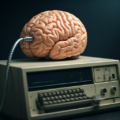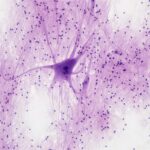With so many new-age digital tools, we often rely on our phone’s camera roll storage to hold our memories and ideas. However, relying too heavily on devices can make our brains sluggish. Luckily, we have our own storage system lying... View Article
Tag Archive: brain
Have you ever wondered how your brain manages to hold information in mind for a short period of time? For instance, when you read the Wi-Fi password off of a cafe’s menu board and have to hold onto it in... View Article
The human brain has a remarkable ability to keep track of a sequence of events, allowing us to properly recall the correct order in which things happened. Researchers have long suspected that neurons in the hippocampus, known as “time cells,”... View Article
In the 1970s, researchers John O’Keefe and Jonathan Dostrovsky discovered that certain cells in the hippocampus of rats were activated when the rats were in specific locations in their environment. These cells were dubbed “place cells” and are now known... View Article
A remarkable new study by Evelina Fedorenko’s research group, published in Nature Neuroscience, showed that brain regions associated with language processing in native English speakers were also activated in speakers of 45 other different languages, while they were engaging in... View Article
Medicine professor Maxim Bazhenov of the University of California San Diego recently published a study with colleagues in the Journal of Neuroscience that provides insight into the sleep mechanisms that may give rise to relational memory. Photo by Fernando @cferdophotography... View Article
Overshadowed by the COVID-19 pandemic, we are also facing a reading crisis. Children are not learning to read properly and/or are falling behind in regard to the curriculum standards expected of them. Teachers are struggling to do enough to take... View Article
High quality sleep is a must if you want to remember peoples’ names and faces
January 12, 2022 11:00 amResearchers from Northwestern University have discovered the key to improving recall of names and faces – and it’s simpler than you would think. The answer is deep restful sleep. Photo by Shane on Unsplash. Nathan Whitmore, a PhD candidate in... View Article
Memories from traumatic life experiences may show up in the brain differently
January 10, 2022 11:00 pmIn psychology and neuroscience, many scholars and students alike are familiar with the saying “neurons that fire together, wire together”. This catchphrase was popularized after the discovery of Hebb’s rule, in relation to long term potentiation and neural synaptic plasticity. However,... View Article
Would it make a difference if you reward yourself during initial learning (encoding), or during retrieval? Cognitive psychology textbooks present long-term memory processing as a series of steps. First, when learning a new piece of information it enters the encoding... View Article
A research study authored by psychology professor Ellen Bialystok and colleagues from York University sought to determine whether language learning was effective at boosting cognitive health among older adults. Participants between 65-75 years old, all of whom were monolingual English... View Article
A news article summarizes results from three neuroscientific research papers that provide evidence-based strategies to enhance memory consolidation. Photo by Katelyn MacMillan on Unsplash. The first paper suggests that if you would like to enhance your memory for prospective events... View Article
University students are made well aware of the importance of having a consistent sleep schedule, and the role that high quality sleep plays in cognitive performance. But how can shorter breaks improve memory? Are rest periods of just a few... View Article
The term “real world” is often thrown around in classrooms. Many teachers will say the course they are teaching will apply in the real world, or that once students graduate they will be let loose in the real world. Yet,... View Article
Photo created with Google Gemini. 2020 will be remembered as the year no one could have ever expected. A global-wide pandemic created a massive disconnect due to the lockdown that emerged, forcing everyone to stay within their homes until it... View Article
Is learning to code more like learning a new language or learning to solve mathematical problems? This study highlighted in this article explores this question. As with human languages, coding involves learning new terms and symbols. To become fluent, you... View Article
This article provides some tips on how to keep the brain active throughout life. Since the brain is arguably the most important organ, one is advised to partake in physical activity and to stay fit and in shape, even as... View Article
In a recent McGovern Institute study described in an article by Anne Trafton, researchers have identified the brain circuit that is responsible for maintaining the motivation to learn new things or engage in daily activities. The circuit was specifically involved... View Article
A large focus of Alzheimer’s disease (AD) research is identifying early intervention strategies to decrease the risk and early onset of the disease. To test these strategies, the populations involved must benefit from the research. Many variables that are linked... View Article
This article provided the results of two studies supporting the hypothesis that areas of the visual system designed to recognize objects that have been repurposed over evolution to allow humans to read. A study in 2012 conducted by French cognitive... View Article



















